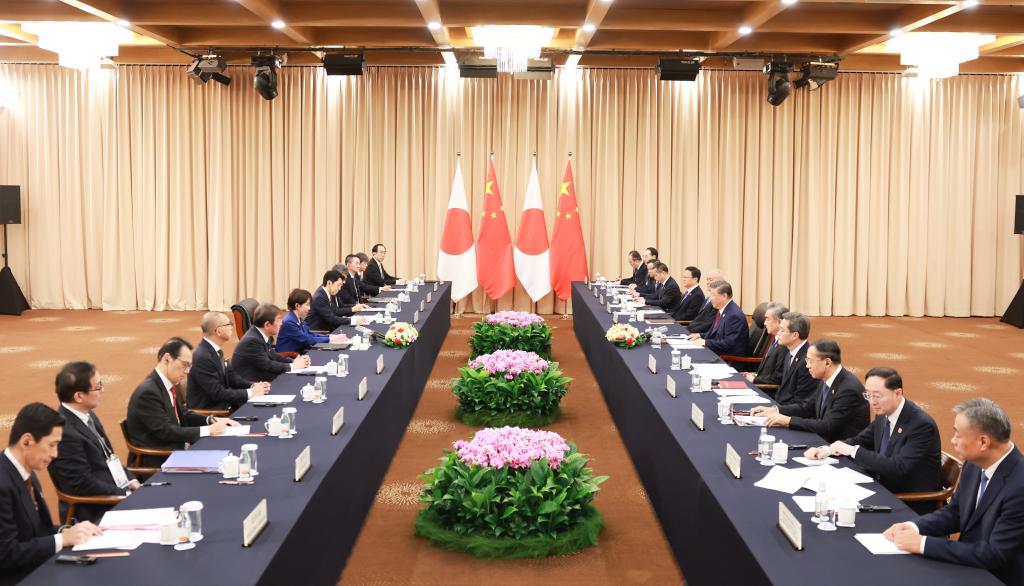
While the meeting between the leaders of China and Japan in South Korea was widely viewed as a first step toward improving bilateral ties, Tokyo's recent wrongdoings concerning the Taiwan question have triggered a strong protest from Beijing, revealing once again the complex and sensitive nature of their relations, observers say.
President Xi Jinping met with Japanese Prime Minister Sanae Takaichi on Friday on the sidelines of the Asia-Pacific Economic Cooperation Economic Leaders' Meeting in Gyeongju, marking their first face-to-face exchange since Takaichi took office last month.
Xi emphasized that the bilateral relationship faces both "opportunities and challenges", and expressed hope that Japan's new Cabinet would develop a correct perception of China and remain committed to the overall direction of peace, friendship and cooperation.
READ MORE: China protests against Japanese PM's Taiwan remarks at APEC meeting
Takaichi described China as Japan's important neighbor, and said that on the Taiwan question, Japan will adhere to its position outlined in the 1972 Japan-China joint statement.
However, tensions soon resurfaced after the meeting. On Friday and Saturday, Takaichi posted photos and comments on social media about her meeting with personnel from the authorities of the Taiwan region on the sidelines of the APEC meetings, referring to the person as a "senior adviser to the Presidential Office of Taiwan".
China's Foreign Ministry lodged a stern protest on Saturday, saying the actions severely violated the one-China principle, the spirit of the four political documents between China and Japan, and basic norms of international relations. The ministry said they also sent a gravely wrong signal to the "Taiwan independence" separatist forces, calling the move "egregious in nature and impact".
Political foundation
"The Taiwan question is China's internal affair and at the core of China's core interests," a ministry spokesperson said. "How it is handled bears on the political foundation of China-Japan relations and basic trust in Japan, and is a red line that must not be crossed."
The spokesperson urged Japan to honor its commitments, rectify its mistakes, take concrete steps to undo the negative effect, stop interfering in China's internal affairs, and act on its statement of building a constructive and stable China-Japan relationship fit for the new era.
On Sunday, the Chinese embassy in Tokyo also expressed strong opposition to Takaichi's improper remarks and actions.
Cai Liang, director of the Northeast Asian Research Center at the Shanghai Institutes for International Studies, said that holding the bilateral talks itself represented progress.
"Both sides have now made their positions clear, and should any disagreements or disputes arise in the future, China will firmly assert its stance and take necessary measures when required," Cai told Chinese digital media outlet The Paper.
Takaichi's rise to Japan's top leadership has drawn attention for her previously hard-line stance on China. Yet, since assuming office, her Cabinet has sent positive signals, emphasizing that Japan views China as an important neighbor and has no intention of decoupling or severing supply chains with the Chinese side.
ALSO READ: High-level talks build bonds
Last week, Foreign Minister Wang Yi spoke by phone with his Japanese counterpart Toshimitsu Motegi and expressed hope that the new Japanese Cabinet would put right "the first button of a shirt" in engaging with China.
Xiang Haoyu, a senior research fellow at the China Institute of International Studies, told China Daily that China's Japan policy has remained consistent and stable, and that Beijing always approaches bilateral relations with a focus on overall interests and a clear sense of right and wrong.
"For China, the key is to listen to what Takaichi's Cabinet says — but more importantly, to watch what it does," Xiang said.
"The two leaders' meeting in Gyeongju is only a first step. The real test will come in how her administration handles major and sensitive issues in the months ahead."
Contact the writers at zhaojia@chinadaily.com.cn


